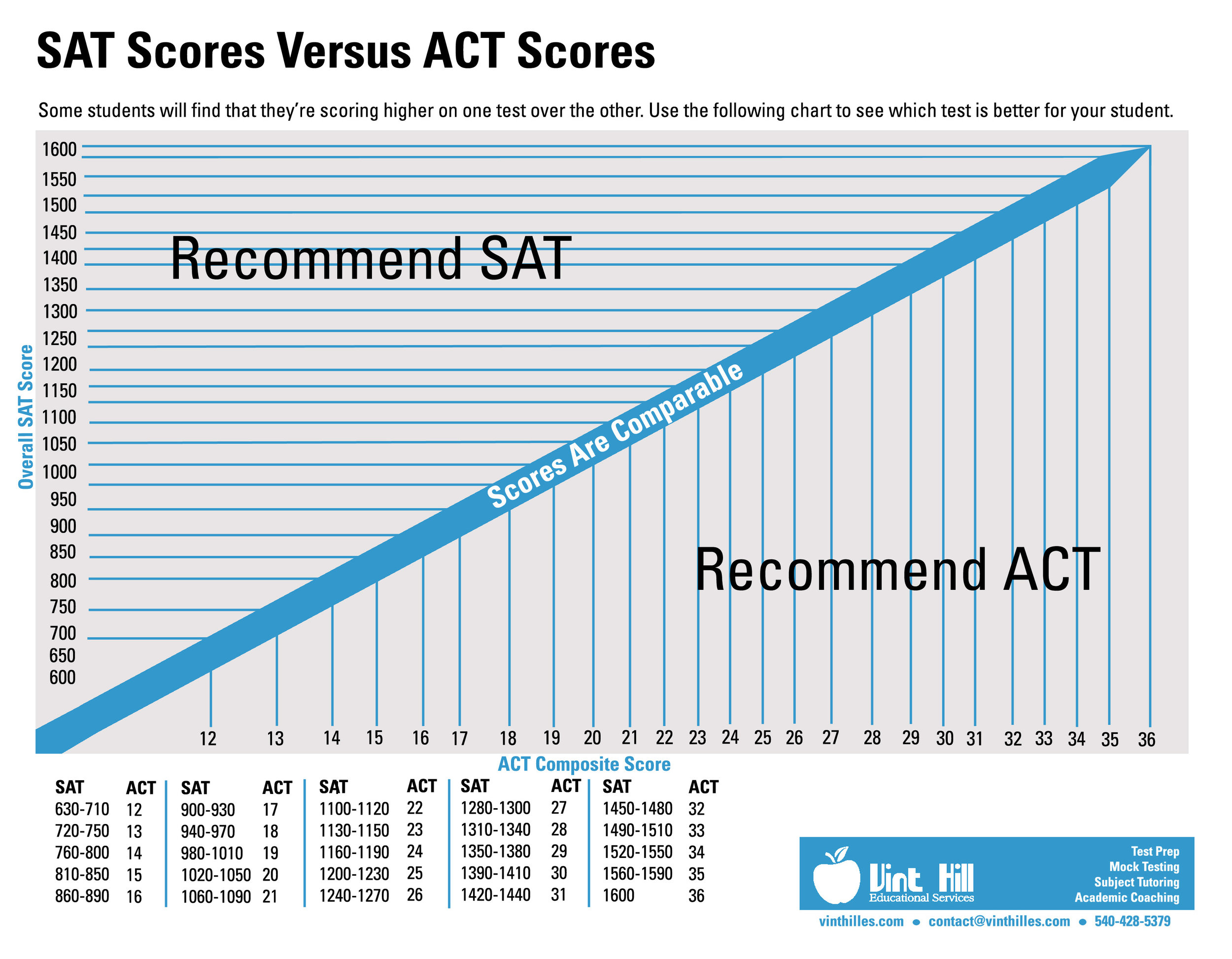It is important to set score goals based upon the student’s baseline practice test scores. You want to set score goals for each section of the test. The goals are based upon the middle 50% scores, for the last freshmen class, to get accepted to a certain college or university. This is why it’s especially important to take a full-length practice test as an initial diagnostic. Not only does it reveal the weakest areas for the student, but it also helps in determining score goals. Another important aspect to taking a practice test is that it will reveal how much prep is needed.
Local Virginia, Maryland and DC middle 50% ACT/SAT scores:
American University:
SAT Middle 50%: 1180-1360 (Critical Reading and Math)
ACT Composite Middle 50%: 27-31
Catholic University:
SAT Math Middle 50%: 510-610
SAT Critical Reading Middle 50%: 500-610
ACT Composite Middle 50%: 22-27
Christopher Newport University:
SAT Middle 50%: 1070-1230 (Critical Reading and Math)
ACT Composite Middle 50%: 23-27
Frostburg State University:
SAT Math Middle 50%: 430-540
SAT Critical Reading Middle 50%: 430-530
SAT Writing Middle 50%: 420-510
ACT Composite Middle 50%: 18-22
College of William and Mary:
SAT Math Middle 50%: 630-740
SAT Critical Reading Middle 50%: 640-730
ACT Composite Middle 50%: 29-33
Georgetown University:
SAT Math Middle 50%: 660-750
SAT Critical Reading Middle 50%: 660-750
ACT Composite Middle 50%: 29-33
George Mason University:
SAT Math Middle 50%: 530-630
SAT Critical Reading Middle 50%: 520-620
ACT Composite Middle 50%: 24-28
George Washington University:
SAT Math Middle 50%: 610-700
SAT Critical Reading Middle 50%: 590-690
SAT Writing Middle 50%: 600-700
ACT Composite Middle 50%: 27-31
Howard University:
SAT Math Middle 50%: 460-680
SAT Critical Reading Middle 50%: 470-670
SAT Writing Middle 50%: 430-670
ACT Composite Middle 50%: 19-29
James Madison University:
SAT Middle 50%: 1180-1270 (Critical Reading and Math)
ACT Composite Middle 50%: 26-28
John Hopkins University:
SAT Math Middle 50%: 680-780
SAT Critical Reading Middle 50%: 660-740
SAT Writing Middle 50%: 660-760
ACT Composite Middle 50%: 31-34
Longwood University:
SAT Math Middle 50%: 460-540
SAT Critical Reading Middle 50%: 460-550
ACT Composite Middle 50%: 19-23
Loyola University:
SAT Math Middle 50%: 560-640
SAT Critical Reading Middle 50%: 540-630
ACT Composite Middle 50%: 25-29
Marymount University:
SAT Math Middle 50%: 460-560
SAT Critical Reading Middle 50%: 470-570
SAT Writing Middle 50%: 460-560
ACT Composite Middle 50%: 20-24
Old Dominion University:
SAT Math Middle 50%: 470-570
SAT Critical Reading Middle 50%: 460-560
ACT Composite Middle 50%: 18-23
Radford University:
SAT Middle 50%: 950-1100 (Critical Reading and Math)
ACT Composite Middle 50%: 19-24
Salisbury University:
SAT Math Middle 50%: 540-620
SAT Critical Reading Middle 50%: 540-610
SAT Writing Middle 50%: 530-610
ACT Composite Middle 50%: 22-26
Towson University:
SAT Math Middle 50%: 500-590
SAT Critical Reading Middle 50%: 490-580
SAT Writing Middle 50%: 500-580
ACT Composite Middle 50%: 21-25
University of Mary Washington:
SAT Math Middle 50%: 500-590
SAT Critical Reading Middle 50%: 510-620
SAT Writing Middle 50%: 490-600
ACT Composite Middle 50%: 22-26
University of Maryland:
SAT Math Middle 50%: 620-730
SAT Critical Reading Middle 50%: 580-690
ACT Composite Middle 50%: 29-33
University of Richmond:
SAT Math Middle 50%: 620-720
SAT Critical Reading Middle 50%: 590-690
SAT Writing Middle 50%: 600-690
ACT Composite Middle 50%: 28-31
University of Virginia:
SAT Math Middle 50%: 630-740
SAT Critical Reading Middle 50%: 620-720
SAT Writing Middle 50%: 620-720
ACT Composite Middle 50%: 29-33
Virginia Commonwealth University:
SAT Math Middle 50%: 500-600
SAT Critical Reading Middle 50%: 500-610
SAT Writing Middle 50%: 490-590
ACT Composite Middle 50%: 21-26
Virginia Tech:
SAT Math Middle 50%: 580-680
SAT Critical Reading Middle 50%: 540-640
ACT Composite Middle 50%: 25-30
Washington and Lee University:
SAT Math Middle 50%: 660-720
SAT Critical Reading Middle 50%: 650-740
SAT Writing Middle 50%: 650-730
ACT Composite Middle 50%: 30-33







